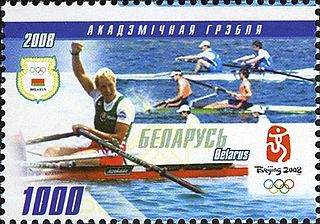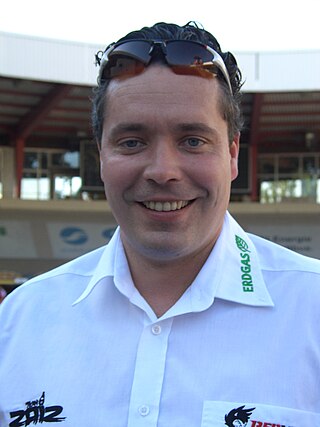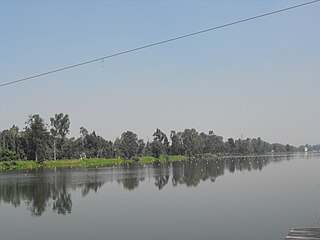Related Research Articles
The men's K-1 1000 metres event was an individual kayaking event conducted as part of the Canoeing at the 1964 Summer Olympics programme on Lake Sagami, Japan.
The men's K-2 1000 metres event was a pairs kayaking event conducted as part of the Canoeing at the 1964 Summer Olympics programme on Lake Sagami, Japan.
The men's K-4 1000 metres event was a fours kayaking event conducted as part of the Canoeing at the 1964 Summer Olympics programme on Lake Sagami, Japan. This event debuted at these games and is only one of two events that has been at every ICF Canoe Sprint World Championships.
Men's lightweight coxless four competition at the 2008 Summer Olympics in Beijing was held from August 10 to 17 at the Shunyi Olympic Rowing-Canoeing Park.

The men's eight (M8+) competition at the 2008 Summer Olympics in Beijing was held from August 11 to August 17 at the Shunyi Olympic Rowing-Canoeing Park. Seven of nine national teams returned from the men's eight competition at the 2004 Summer Olympics to compete again, joined by the host nation. A total of 75 competitors took part, with three substitutions made during the competition. The event was won by Canada, the nation's first victory in the men's eight since 1992 and third overall. The British team took silver, with the Americans finishing with the bronze medal.
Men's coxless four competition at the 2008 Summer Olympics in Beijing was held between August 9 and 16, at the Shunyi Olympic Rowing-Canoeing Park.
Women's eight competition at the 2008 Summer Olympics in Beijing was held on August 11 (heats), 13 (Repechage) and 17, at the Shunyi Olympic Rowing-Canoeing Park.
The men's C-1 1000 metres event was an open-style, individual canoeing event conducted as part of the Canoeing at the 1960 Summer Olympics program on Lake Albano.
The men's K-4 1000 metres event was a fours kayaking event conducted as part of the Canoeing at the 1984 Summer Olympics program.
The men's K-1 500 metres event was an individual kayaking event conducted as part of the Canoeing at the 1988 Summer Olympics program.
The men's K-2 1000 metres event was a pairs kayaking event conducted as part of the Canoeing at the 1988 Summer Olympics program.
The men's K-4 1000 metres event was a fours kayaking event conducted as part of the Canoeing at the 1988 Summer Olympics program.
The men's K-2 1000 metres event was a pairs kayaking event conducted as part of the Canoeing at the 1992 Summer Olympics program. The official report did not make clear on the third repechage, two semifinals, and final which events were the men's K-2 1000 m event and the men's K-4 1000 m event and would thus create confusion to the average reader.
The women's K-1 500 metres event was an individual kayaking event conducted as part of the Canoeing at the 1996 Summer Olympics program.
The men's K-2 1000 metres event was a pairs kayaking event conducted as part of the Canoeing at the 1996 Summer Olympics program.

The men's sprint at the 1992 Summer Olympics (Cycling) was an event that consisted of cyclists making three laps around the track. Only the time for the last 200 metres of the 750 metres covered was counted as official time. The races were held on Tuesday, July 28, Wednesday, July 29, Thursday, July 30 and Friday, July 31, 1992, at the Velòdrom d'Horta. There were 23 competitors from 23 nations, with each nation limited to one cyclist. The event was won by Jens Fiedler of Germany, the first victory in the men's sprint for Germany as a unified nation since 1936. Gary Neiwand of Australia took silver, the third time that nation had a runner-up in the event; Neiwand was only the fourth man to win multiple medals in the sprint. Canada earned its first medal in the men's sprint with Curt Harnett's bronze.

The men's sprint at the 1996 Summer Olympics (Cycling) was an event that consisted of cyclists making three laps around the track. Only the time for the last 200 metres of the 750 metres covered was counted as official time. The races were held on July 24 through July 28, 1996 at the Stone Mountain Velodrome. There were 24 competitors from 16 nations, with nations once again being allowed to have up to two cyclists each. The event was won by Jens Fiedler of Germany, the second man to successfully defend an Olympic sprint title. Curt Harnett of Canada also repeated as bronze medalist; he and Fiedler were the fifth and sixth men to win multiple medals of any color in the event. Marty Nothstein of the United States took silver, the nation's first medal in the event since 1984.

The men's coxed pair rowing competition at the 1980 Summer Olympics took place at Krylatskoye Sports Complex Canoeing and Rowing Basin, Moscow, Russian SFSR, Soviet Union. The event was held from 20 to 27 July. There were 11 boats from 11 nations, with each nation limited to a single boat in the event. The event was won by Harald Jährling, Friedrich-Wilhelm Ulrich, and coxswain Georg Spohr of East Germany, the first men to successfully repeat as Olympic champions in the event. It was also the first time that a crew of the same three men earned multiple medals of any colour. East Germany's three straight medals matched the United States for most among nations to that point. Silver went to the Soviet Union again, though with an entirely different team from its 1976 runner-up crew; the silver medalists this time were Viktor Pereverzev, Gennadi Kryuçkin, and cox Aleksandr Lukyanov. Duško Mrduljaš, Zlatko Celent, and cox Josip Reić earned Yugoslavia's first medal in the event with their bronze.

The men's eight competition at the 1936 Summer Olympics took place at Grünau Regatta Course in Berlin, Germany. The event was held from 12 to 14 August, and was won by a United States crew from the University of Washington. There were 14 boats from 14 nations, with each nation limited to a single boat in the event. The victory was the fifth consecutive gold medal in the event for the United States and seventh overall; the Americans had won every time they competed. Italy repeated as silver medalists. Germany earned its first medal in the men's eight since 1912 with its bronze. Canada's three-Games podium streak ended.

The men's coxed four competition at the 1968 Summer Olympics took place at Virgilio Uribe Rowing and Canoeing Course, Mexico City, Mexico. It was held from 13 to 19 October and was unexpectedly won by the team from New Zealand, which secured the country its first Olympic rowing gold medal. Thirteen teams from 13 nations attended the competition. East Germany earned its first medal in its debut in the event, taking silver. Switzerland took bronze, its first medal in the men's coxed four since 1952.